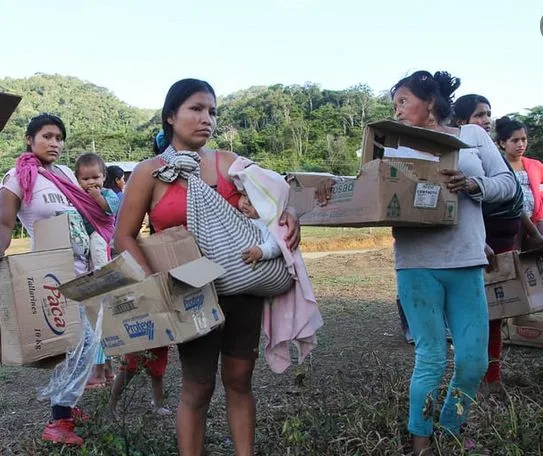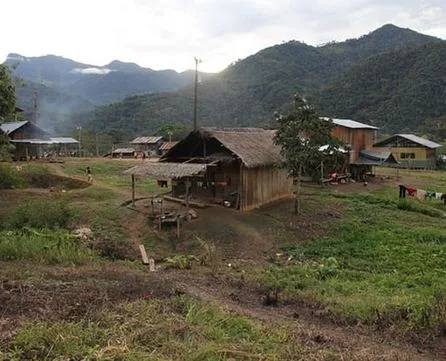Indigenous communities are torn apart, physically and psychologically, by government’s mining program

Shuar women have been the sole residents of Tsuntsuim since most of the men have gone into hiding following warrants for their arrest after they fought against eviction from the village. (Photo: Kimberley Brown)
By Kimberly Brown
Months after they were evicted from their homes to make way for a mine, almost half the population of an Ecuadorian village is suffering from psychological damage, experts say.
Psychiatrists found 42% of the indigenous Shuar people of Tsuntsuim village suffering from mental health problems and trauma. Many of the villagers had been involved in violent confrontations with Ecuador’s military as they were removed from their homes.
The mental ordeal has manifested itself in depression, severe headaches, insomnia, tremors and tachycardia (a racing heart rate). Trauma caused by the displacement and anxiety about what would happen to them next were the main triggers for these symptoms, said the authors of the report, which was released by a group of doctors, psychiatrists and indigenous rights activists.
Children were particularly traumatized by the noise of the helicopters and drones that had circled overhead during the eviction, according to medical researchers.

People began returning to their homes in Tsuntsuim in May, five months after they were forcibly removed, when military and police abandoned their posts there.
Residents said the soldiers destroyed crops and set animals loose. “They were left without any kind of economic or food options and were pushed into forced migration,” said Fernanda Solíz, one of the report’s authors and a doctor with the Movement for the Health of the Peoples of Latin America. “This is a process of impoverishment and a loss of subsistence and sovereignty.”
Tsuntsuim is one of the latest communities affected by Ecuador’s mining industry, which is being promoted as necessary for growth in the developing nation. According to Ecuadorian law, everything in the ground belongs to the state. The money earned from extracting its bounty – be it minerals or petroleum – funds public services.
But researchers say the opposite is true. “This development model impacts communities,” said Erika Arteaga, a doctor with the Latin American Association of Social Medicine (Alames), a co-author of the report. “The mine displaces people, and the impact is direct. It’s this industry that makes children lack nutrition.”
The territorial conflict around Tsuntsuim peaked in August 2016 when those living in the Shuar village of Nankints were forcibly evicted from their homes by the army because they were living on the site for the planned San Carlos Panantza copper mine.
Ecuadorian government officials claim the Shuar had no land rights and were living there illegally, while the Shuar community claim the region as part of their ancestral land.
After the eviction, residents made several attempts to re-enter Nankints leading to an aggressive standoff with the authorities in December 2016. The then president, Rafael Correa, called a state of emergency in the province of Morona Santiago and sent in extra forces, who raided homes and made several arrests in Tsuntsuim, where most of the people from Nankints had fled. Nankints is now a military protected mining camp, surrounded by barbed-wire fencing.
“We suffered a lot,” said Maria Natalia Nankamai, who was chased out of both Nankints and Tsuntsuim. “The kids were screaming when the helicopters flew overhead, but we couldn’t do anything.” She stayed with relatives for months before moving back to Tsuntsuim in May.
The Shuar have been resisting major development projects in the area for more than 10 years – not only to save their homes but also because they have begun to benefit from mining for gold on a small scale.
Guillermo Nayash, a local resident, said artisanal mining allows him to work independently and under better conditions than working in a large mining company, or doing manual labour in the cities.
But small-scale mining continues to be controversial among community members – many believe the rights of nature and sustainability should come first.
Tensions in the region have recently subsided as the Panantza copper mine project has stalled. The Shuar hope they can reach a deal with the new government of Lenín Moreno – who became president in May – to stop its development.
The Ecuadorian government did not respond to a request by the Guardian to comment.
__________________
Credit: The Guardian, www.theguardian.com




















